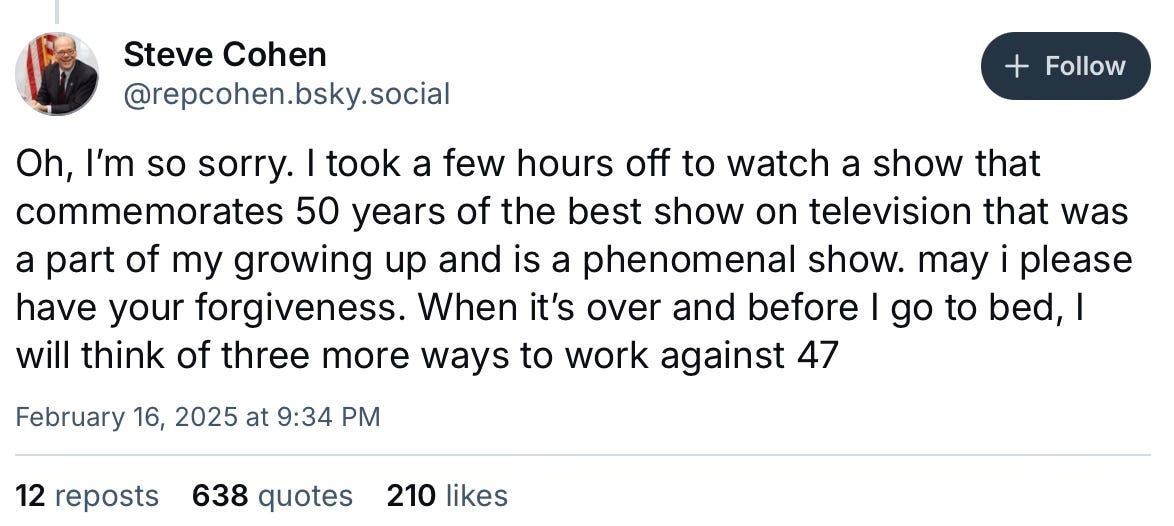On Valentine’s Day, the Democratic Party posted a meme to their Bluesky account: “Will you be my president?” it read, with boxes to check for Yes or No. It was “to Elon,” of course, “from Donald” — and with plenty of hearts to make sure no one could miss its homophobic implications. Liberal leaders always fall into this trap whenever Trump gets chummy with another man — especially a powerful one. The Putin memes alone could fuel an entire study on “not that there’s anything wrong with that” attempts at political satire. Personally, I’d rather the Dems just cut to the chase and make a poster that says “If you want love to win, vote for us you disgusting faggot.” But as any f-slur dropping dom can tell you, that would require a shred of confidence.
This valentine arrived near the end of Trump’s fourth week in power. Since January 20, the civic and psychic damage has been catastrophic, and environmental and societal destruction isn’t far behind. All evidence points to the dismantling of federal restrictions on the rich, all but handing the United States to a small coterie of billionaires as their own fiefdom to exploit. The rest of us, alas, can enjoy euthanasia by neglect, whether by dying in a border camp, losing access to meds, drinking from a tainted water supply, ingesting untested food, or ten thousand other lethal banalities. Meanwhile, the “opposition party” is tittering over suggesting that the two most powerful men in the world are lovers. At least when they aren’t promising that there will be “meetings” about “what’s happening.”
As Musk’s role1 in the administration began growing, it became clear that some version of a coup was happening in plain sight. Democrats, of course, were shocked and appalled — and they said so online. But saying so isn’t enough. As Cathy Park Hong put it on Instagram: “When the Korean president staged a coup, lawmakers climbed over the fence, barricading the front doors against the military and voted against his attempt at martial law at 2 in the morning. But American lawmakers are just tweeting about the coup.”
This pattern of behavior isn’t surprising. In fact it’s familiar. During the first Trump presidency, many liberals, including some of the most despicably conservative ones, enjoyed a strange celebrity, mistaken for “heroes” of “the resistance.” This aesthetic reached its apotheosis, I think, in Nancy Pelosi’s petulant and viral clap following Trump’s State of the Union speech in 2019. For four years, in a state of obvious desperation, liberal voters fervently stanned some of the most lifeless and bloodless politicians ever to scuttle in front of a camera, all in the hope that these people would save us all from a fascist takeover. In 2020, after enormous effort throughout a hellish year, voters handed them the White House, the Senate, and the House of Representatives. And while Biden’s administration did a lot of tinkering under the hood, the bus we’re all stuck in still looks and sounds like shit and we’re all still rattling toward a cliff. Most importantly, the people voters chose to save them from fascism spent four years berating those on the left for being mean, for standing up for trans rights, and for demanding that liberals actually use their power. And then they lost that power.
Cynically, I’ve come to believe that Democrats love losing elections. Rather than shoulder any kind of civic responsibility, it’s much easier to send emails asking for more money, for more votes, for more volunteers. And now there’s another dynamic, which is even sadder, even slimier, than hoping to fatten one’s loser coffers: begging for attention online.
The problem with posting a Trump/Musk valentine in 2025 isn’t just that it’s homophobic. This kind of meme was homophobic in 2017. The problem is actually much more systemic and banal: The Democrats think posting is politics.
Shortly after the inauguration,
published an essay about the technology that has effectively undermined most political action in this country: the internet. One thinks of the obvious examples of Musk and Zuckerberg, who control two of the most influential social media empires in the world. Both donated incomprehensible sums to Trump’s campaign and attended the inauguration. But there’s also TikTok, whose Chinese ownership certainly doesn’t save it from being a right-wing propaganda machine; and of course there’s the self-congratulatory Twitter-shaped haven for liberals, Bluesky, which is doing its best to panic, paralyze, and fracture what’s left of the #resistance from the first Trump circus. Beyond social media platforms, Amazon, DoorDash, Uber, Airbnb, and countless other “apps” all ensure that one no longer need interact with human beings to conduct commerce, despite commerce being the one form of social interaction most Americans are likely to have on a day-to-day basis. Each company, in its own way, seeks to isolate its users — preying, of course, on our most lucratively vulnerable emotions: loneliness, anger, and insecurity. It’s no accident that the right excels in this environment. As Moskowitz puts it, “The internet in its current form and the Republican Party are part-and-parcel of the same system; a system that derives its power from increasing our isolation from each other so that its rulers may more effectively manipulate our psyches.” What’s worse, they add, is thatwe’ve convinced ourselves that the internet is not the cause of our loneliness and rightward trajectory, that perhaps it’s even the solution! Think of all the TikTokers who cried about how banning TikTok was really about censoring leftwing speech and breaking social bonds amongst progressive youth; an argument that falls flat when you consider that Gen Z is trending more conservative than liberal, and that the internet is largely responsible for this trend.
During the first Trump presidency, it was hard to tear one’s eyes away from the screen. Sharing the news did feel like activism — I’m informing my followers, you might have thought, when in reality you were simply overwhelming the media environment with a chaotic and spectacular blitzkrieg of information. Tweeting at your representatives felt like participating in democracy, even though people with actual political experience begged you repeatedly to pick up the phone and call. Showing support for Nancy Pelosi’s artful little clap felt like joining a movement, despite being home alone and addicted to the lamest version of a drug ever created. In some instances, as
recently pointed out, the left went so deeply online that it began to mirror the “techno-libertarian right” in their embrace of “atomized social relations, transactionalism, and individualist self-fashioning as the acme of freedom.” This ensured that “the left, like the right, is in this way completely in accord with the imperatives of our catabolic capitalism, as befits a political movement whose politics are conducted entirely within the precincts of Mark Zuckerberg’s participatory panopticon.” It doesn’t matter what sort of moral compass you show up with; the ad-based viral model of social media is fascist in its architecture, and will always warp your ethics to serve its own purposes. The brilliance of Twitter — especially pre-Musk Twitter, when normal people still used the platform — is that it could turn even the Buddha into an idiot bully.In 2025, the landscape has changed. Most users — even on Instagram — seem to understand, if only tacitly, that posting is not politics, that sharing a photograph of Trump’s bloated face is not going to change anyone’s mind. Change happens in the physical world, and in that world people show up. They make themselves visible, and in large numbers. You can’t block traffic with an Instagram story. You can’t pull down a statue with a tweet. The illusion of agency these platforms offer is meant to keep you out of the streets. It’s meant to keep these statutes safe. The only people who, en masse, haven’t seemed to figure this out are the people we elected to stand up to the party in power — the “leaders” who thought a homophobic valentine was some form of resistance and not just another way to piss off the only supporters they have left. To go back to Hong’s point: we deserve elected representatives willing to barricade a door, not compose half-clever tweets about the rule of law. We deserve party leaders willing to physically detain Musk and his people until sensitive data can be made secure. We deserve party leaders willing to shut down server farms and interrupt supply chains. We deserve party leaders willing to face consequences — or at least consequences beyond the threat of primaries and “people were mean to me online.” In other countries facing fascist coups, elected officials have risked, and sometimes lost, their lives. In ours, Democrats can’t even risk missing Saturday Night Live.2
During the first Trump presidency, the opposition party bought the promise of social media and fell for its illusions: that people liked their content, therefore they liked them. Even with only 6,000 followers at my most “influential,” I can attest to how exhilarating it feels to go viral for some witty thing you’ve said, especially an attack on fascist stupidity. But going viral didn’t put me in the street. It didn’t take me to a protest. It didn’t change any senator’s mind. At most, it showed up on a stupid t-shirt someone was selling online. As with social media itself, all I’d done was create content someone else could use to make an easy profit. And this, ultimately, is all Pelosi’s clap was good for: an opportunity for the people who own the server farms on which most of the internet unfolds to make a little more money from all the data we created in celebrating this pathetic spectacle, this supposedly mockery of the man who has returned to dismantle the entire country. And now, because the Democrats squandered their four years in power — four years they could’ve spent stripping Trump of everything he has, impeaching every single one of his appointments, and walking back everything he did — the people who own the internet now own the federal government.
If you’re an elected Democrat and you’ve managed to make it this far without rolling your eyes and posting another excuse, let me offer you some advice. Get off the internet. Show up at our protests. Obstruct your “colleagues” at every turn. Sabotage their technology. Stop begging for your supporters’ respect and try earning it for once.
Say what you will about Trump’s idiocy, but it’s cannily smart nonetheless for a dictator to put a naïve, unelected loser — who’s not only desperate for attention and unacquainted with consequences of any kind, but totally lacking his own base of armed and violent supporters — in charge of very publicly making all of the ruling party’s most unpopular decisions. Otherwise, it doesn’t quite track that the man who loves firing people so much that he created a TV show around it would ask someone else to fire 200,000 federal employees. There is fear in this judgment, and no one is pathetic enough to die for Musk, nor care enough to avenge him if anything were to happen.





Hi Patrick! Please read The Age of Surveillance Capitalism by Shoshana Zuboff if you haven't.
Don't quite agree 100 percent, but do fully agree with your more recent endorsement of angry dissent as a viable instrument for reconciliation with the potential to move us up a level. Thus I hope to read lots more from you and to remain at least marginally at odds.